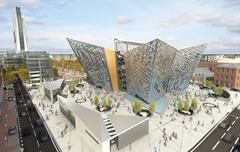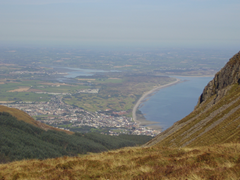Planning for tourism – PPS16
 Growing tourism depends on protecting the environment. agendaNi reviews what this means in practice through PPS16.
Growing tourism depends on protecting the environment. agendaNi reviews what this means in practice through PPS16.
Planning applications for tourism purposes must respect the environment on which the trade depends, according to Northern Ireland’s first specific policy on the subject.
Draft Planning Policy Statement 16 (PPS16) was published in November and its consultation runs to 25 March. As with the other statements, it applies to Northern Ireland as a whole. The final version’s provisions will prevail unless they are outweighed by other overriding policy or material considerations.
In a timely message, it warns: “Nothing in this document should be read as a commitment that public resources will be provided for any specific project.”
Objectives
Five objectives are set out:
• facilitate “sustainable tourism development” in an environmentally sensitive manner;
• safeguard tourism assets from “inappropriate” development;
• “utilise and develop” the tourism potential of settlements;
• sustain a “vibrant” rural community by supporting tourism development;
• ensure a high standard of quality and design for all tourism development.
Developments should have an “appropriate nature, location and scale” whether they are sited in urban and rural areas.
Eight planning policies are then outlined:
1. safeguarding of tourism assets;
2. tourism development in settlements;
3. tourism development in the countryside;
4. tourist amenities in the countryside;
5. hotels in the countryside;
6. self-catering accommodation in the countryside;
7. static holiday parks and touring caravan sites in the countryside;
8. criteria for tourism development.
A tourism asset is any feature associated with the built or natural environment which is of “intrinsic interest” to tourists. Planning permission would not be granted for developments which fall inside the “visual setting” of a tourism asset and have an “adverse impact”. The policy recognises that the views and scenery around tourist attractions are worth protecting, and complements existing policies with the same aim.
As a rule, proposals for tourism developments in settlements would be approved. Tourism can support hotels, restaurants and cinemas “as well as promoting a sense of urban vitality.” In turn, the “synergy” of having all these facilities in one town centre can benefit tourism. Development plans would, though, also need to be considered e.g. a proposal in an industrial area or near a nature reserve may be inappropriate.
Five of the eight policies cover the countryside, where planning is a much more sensitive issue. These tie in with PPS21, which allows for farm diversification, the conversion of non- residential buildings, and developments in dispersed rural communities. PPS4 also allows for the redevelopment of an established business for tourism purposes.
More than other industries, rural tourism depends on a “pleasant and attractive countryside and a good quality environment”. Converting, re-using or extending existing buildings is strongly preferred. A new building would only be considered if a rural location is essential or if it cannot be built in a nearby settlement. In these cases, planners would prefer applications on the fringes of an existing settlement.
Tourist amenities are amenities, facilities or services provided primarily for tourists, not including accommodation. Applicants must also respect the original building’s design and materials. Proposals inside settlements would be a priority, but some exceptions can be made e.g. a stop on a mountain bike trail.
A regionally significant or large-scale application would include a ‘tourism benefit statement’ to demonstrate how it will create revenue and jobs, and contribute to the province-wide Tourism Strategy. These will also be referred to the Tourist Board.
An existing rural building can be replaced by a hotel if it meets all the following criteria:
• permanent structure;
• sufficient size for hotel use;
• conversion is too costly;
• a “significant environmental benefit” will result;
• integration into the surrounding landscape;
• high quality design, appropriate to a rural setting and “local distinctiveness”;
• access, car parking and other necessary services are available or can be provided safely, without damaging the environment, or the locality’s appearance or character.
New hotel builds in the countryside would only be permitted if:
• no suitable site is available inside a settlement;
• conversion or redevelopment is not possible; and
• the development is “clearly associated” with the nearest settlement but will not dominate it, “adversely affect” the landscape or contribute to urban sprawl.
Permission to expand existing rural hotels would only be possible if the new or replacement building is smaller than the current one, and if the design is respectful.
Clusters of three or more self-catering units would be approved if they are:
• located in the grounds of an existing hotel or an acceptable proposed hotel;
• close to an existing or proposed tourist amenity, which is or will be a “significant attraction in its own right”;
• restorations of an existing clachan or close.
Units must have a short-term opening season i.e. a maximum of three consecutive months in any one calendar year, be for holiday letting only and not for permanent residence. Self-catering should contribute to existing or planned tourism developments.
For static caravan parks, new sites and large scale extensions will only be permitted on sites identified in a development plan. Small touring caravan sites should be less than 1 hectare in size, effectively screened off, and not located beside the coast, a river or an inland lake. Larger sites would be closely scrutinised for their environmental impact.
Development plans
Strategies to develop local tourism could be drawn up alongside development plans, PPS16 suggests. These could incorporate: which areas and activities offer potential growth; how to best accommodate future demand, how to safeguard “key tourism assets”; environmental considerations; and tourism’s contribution to economic development, conservation and urban regeneration. Early consultation should take place between the plan team, district councils, relevant government departments and other key agencies e.g. the Tourist Board.






